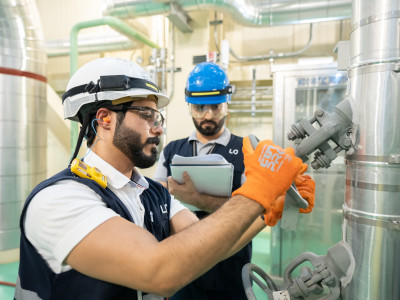 A new programme has been developed by the Emirates Nuclear Energy Corporation’s (ENEC’s) operating and maintenance subsidiary, Nawah Energy Company, to educate and train UAE National High School graduates. The Diploma in Nuclear Technology (DNT) will equip the next generation with the skills and training needed to work at the Barakah NPP.
A new programme has been developed by the Emirates Nuclear Energy Corporation’s (ENEC’s) operating and maintenance subsidiary, Nawah Energy Company, to educate and train UAE National High School graduates. The Diploma in Nuclear Technology (DNT) will equip the next generation with the skills and training needed to work at the Barakah NPP.
Nawah is committed to “Emiratisation” as part of efforts to develop a sustainable nuclear energy industry in the UAE. The programme will take place at ENEC’s headquarters and at the Barakah Plant in Al Dhafra Region in Abu Dhabi.
The DNT is a 24-month, entry level programme for high-performing students aimed to encourage the next generation of UAE Nationals to pursue a career as nuclear professionals. The first intake of high school graduates will begin training in September with the aim of becoming local operators at Barakah. The course will include knowledge and understanding of science and engineering fundamentals and nuclear plant systems.
“We are committed to operating the Barakah Plant according to the highest level of excellence and efficiency, by well-trained operations teams, said Nawah CEO Engineer Ali Al Hammadi. “Through the DNT, our trainees will develop knowledge and understanding of nuclear energy and the vital role played by local operators in supporting clean energy generation. Equally important to our commitment to safe operations is our commitment to developing our UAE national workforce.”
He added: “This programme is an excellent opportunity for bright young high school graduates to come and receive high-quality training to become part of one of the most important industries for clean electricity generation, which is key to growing the Net Zero economy. It is important for us that we provide training opportunities that cater for the range of talents and educational levels in the UAE, and this inclusive approach will certainly add to the richness and diversity of skills we have across our teams.”
Construction of the $20bn Barakah NPP began in 2011 after South Korea won a tender for the project in 2009. Korea Electric Power Company (KEPCO) led the consortium that is building the plant comprising four APR1400 reactors. Unit 1 started up and was connected to the grid in 2020, followed by unit 2 in 2021. Unit 1 began commercial operation in April 2021 and unit 2 in March 2022. Unit 3 was connected to the grid in October 2022 and began commercial operation in February. Unit 4 completed hot functional testing in July 2022 and is nearing commissioning.
With all four units operating, the 5.6 GWe plant will contribute up to 25% of the UAE's National Determined Contributions to Net Zero and be the largest source of dispatchable clean electricity.
The Barakah plant will continue to provide highly specialised jobs over its operating lifespan, of at least 60 years, ENEC said.
Meanwhile, the UAE's first Master of Science Programme in Medical Physics has been launched by Khalifa University of Science & Technology and the Federal Authority for Nuclear Regulation (FANR). The aim is to produce a trained cadre of medical physicists to contribute to the UAE’s radiation protection infrastructure. The MSc in Medical Physics programme is one of the outcomes of the UAE National Strategy for Education, Training & Qualification in Radiation Protection. The strategy was developed by the Radiation Protection Committee chaired by FANR. The first intake of students has already completed the first year.
Image courtesy of ENEC






